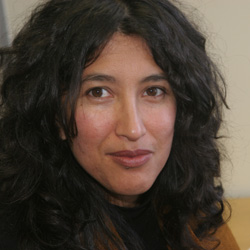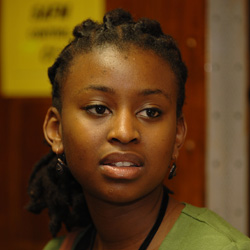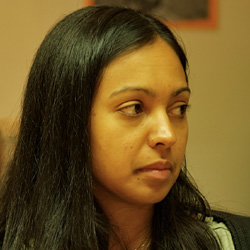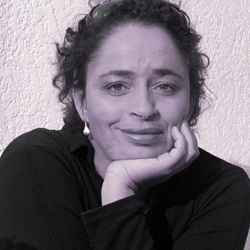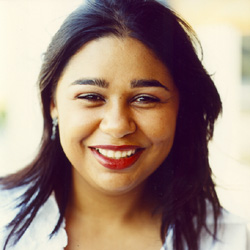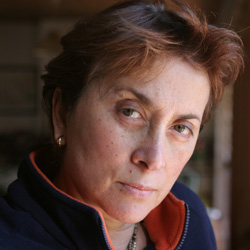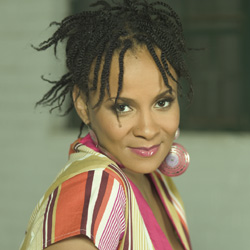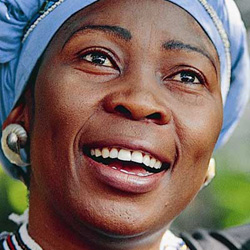









Alex Smith
Amanze Akpuda
Amatoritsero Ede
Amitabh Mitra
Ando Yeva
Andrew Martin
Aryan Kaganof
Ben Williams
Bongani Madondo
Chielozona Eze
Chris Mann
Chukwu Eke
Chuma Nwokolo
Colleen Higgs
Colleen C. Cousins
Don Mattera
Elizabeth Pienaar
Elleke Boehmer
Emilia Ilieva
Fred Khumalo
Janice Golding
Lauri Kubuitsile
Lebogang Mashile
Manu Herbstein
Mark Espin
Molara Wood
Napo Masheane
Nduka Otiono
Nnorom Azuonye
Ola Awonubi
Petina Gappah
Sam Duerden
Sky Omoniyi
Toni Kan
Uzor M. Uzoatu
Valerie Tagwira
Vamba Sherif
Wumi Raji
Zukiswa Wanner
![]()
Credits:
Ntone Edjabe
Rudolf
Okonkwo
Tolu
Ogunlesi
Yomi
Ola
Molara Wood
![]()
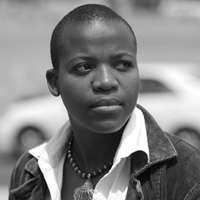 |
||||||||||||||||||||||
8 South African Women Writers
Photographs: (except Gcina Mhlope) by Victor Dlamini |
||||||||||||||||||||||
|
Gabeba is the author of The Dream in the Next Body(2005),
The Museum of Ordinary Life (2005), and A Hundred
Silences (2006). The Dream in the Next Body
was named a Notable Book of 2005 by the Sunday Independent
in South Africa and was a Sunday Times Recommended
Book. A Hundred Silences was selected for Exclusive
Books Homebru in 2006, and was short-listed for the 2007 University
of Johannesburg Prize. In 2005, Gabeba received the DaimlerChrysler
Award for South African Poetry and held the Guest Writer Fellowship
at the Nordic Africa Institute, the second person after Ama Ata
Aidoo to receive this honour. Gabeba is the recipient of a Civitella
Ranieri Fellowship for 2008. Her poetry appears in the anthologies
Worldscapes (Oxford University Press, 2005), Ten Hallam
Poets (Mews Press, 2005), Voices from All Over
(Oxford University Press, 2006) and Birds in Words
(Umuzi/Random House, 2006) and in journals in South Africa, the
United States and Europe, and in translation in Karavan and
Post Scriptum (Stockholm), Cumhuriyet (Istanbul)
and Adamar (Madrid). The Silence Before Speaking,
a volume of her poetry translated into Swedish is forthcoming
from Tranan publishers. Her fiction appears in Chimurenga
magazine, Twist, a short story anthology (Oshun
Books, 2006) and Cape Town Calling (Tafelberg,
2007). Gabeba is also a scholar, and has written for the media.
Details of her academic writing and her articles in the Sunday
Independent, Mail & Guardian, Oprah and Real Simple
magazines can also be found on gabeba.com. She will be one of the featured writers at the Franschoek Literary Festival in 2008. |
|||||||||||||||||||||
Matlwa is not only the youngest European Literary Award winner to come out of South Africa but in addition, continues to manage a hectic writer’s schedule of book readings, literary fairs et al, with a full-time schedule as a medical student at University of Cape Town. She cites Zimbabwean Tsitsi Dangarembgwa’s Nervous Conditions as one of her favourite books. |
|
|||||||||||||||||||||
|
||||||||||||||||||||||
It is a general sentiment among writers that academics ironically make for lousy writers. Award-winning writer and film scholar Mary Watson may just be proof that this is a nonsensical statement though. Among Watson’s literary achievements are: a Meritorius Publication Award for her collection of short stories, Moss, and a Caine Prize for African Writing for her short story Jungfrau. Andre Brink has said of her stories: “I can honestly say that I have seldom, in South African literature, come across short stories of such suggestive power as these.” Watson is currently completing her Ph.D. in Film Studies at
the University of Cape Town, where she is also a lecturer in Film
Studies. She is also working on her first novel. |
||||||||||||||||||||||
In ‘Mouthful of Stones’, a poem
by Phillippa Yaa de Villiers’ she states: And that is exactly what she is. Like most writers, de Villiers has always been a writer. de Villiers recalls that she started writing from the age of eleven but having studied drama at Rhodes University, she was an actress from 1990 and only became more serious about the art of writing in 1998. It was then that she got back to writing. Starting with screenplays, she is credited with being one of the screenwriters for a four part series with Swedish television for a four part series entitled ‘Score’; Backstage, a South African soapie; Tsha Tsha, an SABC television drama and being part of the original screenwriting team of Soul Buddies and Soul City, dramas about HIV/AIDS (the former a youth drama). Throughout this period, she was still writing her poetry. It was in 2005 though, that she became one of the celebrated poets on South Africa’s spoken word scene. With performances at the Women’s Festival in 2005, she followed her performance with publishing a collection of her poetry, entitled Taller than Buildings, in November 2006. This daughter of an Australian mother and a Ghanaian father who was raised by an Afrikaner family in South Africa from a very early age (her mother was from a conservative religious family and in those days it was not done to have a child with a black man) has used the adversities of being a biracial child raised by a white family in an apartheid South Africa, not as a crutch as some would do but as a weapon to strengthen her art. In August, she wrote and performed a one woman play at the Market Theatre to critical acclaim. The play, which centred on her confusion about her identity at a young age, played to full house for the length of time it was staged. As a follow up to her success in September, de Villiers wowed the crowds at the much-celebrated poetry festival, Durban’s Poetry Africa in early October this year together with the likes of Napo Masheane, Chirikure Chirikure and musician and poet, Chiwoniso Maraire. Without taking a break, together with Masheane and Lebogang
Mashile, they formed part of the delegation from South Africa
that attended and performed at London’s Word Power International
Festival of Black Literature. From London, de Villiers went to
Birmingham where she recorded some of her poetry in collaboration
with Fred Wisdom. She is currently working on another anthology
of her poetry that she hopes to have out in 2008 as well as youth
novel on a middle class black child dealing with the legacy of
slavery. Having been acknowledged and applauded on the local scene,
de Villiers is clearly one of the writers to watch out for on
the international scene in the next few years. |
|
|||||||||||||||||||||
|
Maxine Case was born in Cape Town into a family of readers and writers. Her mother is the well-known children’s author, Dianne Case, and her sister Bonita also writes. She never planned becoming a writer, but somehow found she couldn’t stay away from reading, and finally, from writing. After school, she studied advertising and then completed an IMM diploma. After a brief stint in the corporate world, her nature won out and she followed her passion for books – cutting her teeth in the publishing industry by “doing everything” for Kwagga Publishers. She later freelanced as a project manager for authors both locally and abroad ghosting several books as diverse as children’s books, religious tracts and the inevitable self-help books. She found herself increasing doing more and more rewriting and less and less editing; and so inspired by this, she started to write her own work. She was the deputy editor of Indulge, a woman’s magazine published in Nigeria. Just under a year ago, she joined NB Publishers as the marketing and promotions co-ordinator. Her first published work, a short story called “Homing Pigeons” was included in African Compass: New writing from Southern Africa 2005, a collection published by New Africa Books. Maxine Case was selected as the winner of the Commonwealth Writers' Prize – Africa region in the category Best First Book for her debut novel, All We Have Left Unsaid published in June 2007. |
|||||||||||||||||||||
Rayda Jacobs has established herself as a writer of accessible and thought-provoking novels. Her first two novels, Eyes of the Sky and The Slave Book, are set at the Cape at the beginning of the eighteenth and nineteenth centuries respectively. Her third novel, Sachs Street, is again set in contemporary Cape Town, in the historic Bo-Kaap, with flashbacks to the fifties. Her fourth novel, Confessions of a Gambler won the Sunday Times Fiction Award and the Herman Charles Bosman Prize for 2004 and is currently being made into a movie. Jacobs has a penchant for exploring the intricate conflicts and interactions between South Africans of different colours and cultural backgrounds. She also reveals unexpected aspects of the reality of the Cape Muslim community to which she returned in the early nineties, after a 27-year stay in Canada. Through her short films, newspaper columns, radio programmes and talks, Jacobs has developed a reputation as an open-minded explorer of the rich cultural and religious heritages found in the Western Cape. |
|
|||||||||||||||||||||
|
Although
known on the African literary scene as the 2006 Noma award winner
for her poetry anthology, In the Rhythm of Ribbon,
Lebogang Mashile is so much more than this. As part of the now defunct
Feelah Sistah collective (together with Napo Masheane, Ntsiki Mazwai
and Mysha Jenkins), Mashile can take her share of credit for taking
poetry from being an underground phenomenon to becoming a part of
South Africa’s pop culture scene post 1994. Mashile shies
away from the ‘starving artist’ label and believes that
artists should ensure that their art works for them to achieve greater
goals and give them better lives. A regular at Poetry Africa, (she
performed there in 2003, 2004 and 2006), Mashile is best known in
South Africa as the woman who took no prisoners as she went to the
depths and breadths of South Africa in her quest to bring different
cultural habits to light as well as questioning some of the so-called
‘cultural’ behaviours that seem to subjugate women in
her weekly documentary L’atitude’. Her show, which last
screened in 2006 and always ended with Mashile reciting a poem,
garnered much kudos from womenkind (I recall a young girl in Cape
Town telling me that what she learnt most from L’atitude was
that being a woman is okay) for being empathetic without shying
away from difficult issues be it virginity testing or polygamy.
It is this passion she showed on L’atitude that she has also
brought to the world of print as columnist for South African women
magazine, True Love. A busy woman, Mashile continues to perform at various events; was the Master of ceremonies at the 10th Time of the Writer Festival in Durban in March 2007; was a guest at the Berlin Book Fair; and attended and performed at London’s Word Power International Festival of Black Literature with Masheane and de Villiers. She is currently working on her next anthology, out in 2008. A revolutionary as a poet, Mashile is also currently working with celebrated South African choreographer, Sylvia Glasser as she tries to take poetry to work with different mediums and therefore bring the art to a wider audience. The show, with a working title of ‘Moving into Poetry’ is expected on our stages sometime in 2008. She dreams of starting a multinational multimedia house and there is no doubt she will achieve her dreams because, with her talent and ambition, Mashile, already celebrated, is clearly yet to reach her peak as an artist. |
|||||||||||||||||||||
| Photo: Ogilvy - Dawn Voice Out | ||||||||||||||||||||||
In 2000 she released an award-winning storytelling CD called Fudukazi's Magic for German audiences. She has also written both story and music in collaboration with guitarist, Bheki Khoza, for the Animated Tales of the World TV series. In 2001 her CD and book of Nozincwadi Mother of Books was produced as part of her nationwide reading road show to South African rural schools. Her work has received awards from BBC Africa Service for Radio Drama, The Fringe First Award in the Edinburgh Festival, the Josef Jefferson Award in Chicago, and OBBIE in New York. Yet, she does not only limit her writing to children’s books but also keeps the adult audience enthralled with her poetry, short stories and plays. Gcina Mhlophe has received Honorary Doctorates from the London Open University as well as the University of Natal. photo: Paul Weinberg/www.ukzn.ac.za |
|
|||||||||||||||||||||


